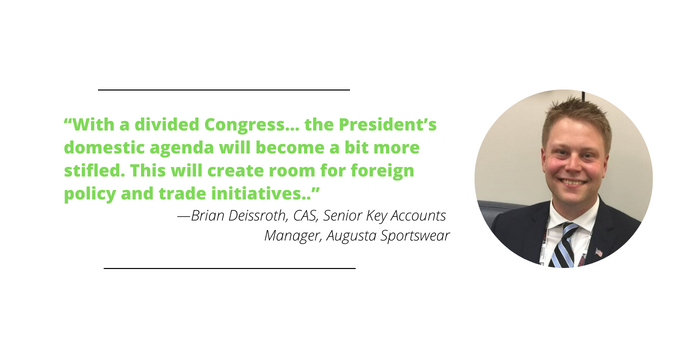The U.S. mid-term elections have come down to a close finish with, as of publication, the Democrats holding onto control of the Senate and the Republicans appearing to win a slim majority in the House.
The effects of this shift in legislative makeup will ripple through the country in myriad ways. For the promo industry, one outcome that bears watching is the elections’ impact on foreign trade.
Trade Policy
The 118th Congress – January 3, 2023, to January 3, 2025 – may shake up U.S. trade policy. With a divided legislature, observers expect much of the White House’s domestic agenda will likely be stalled but that possibilities exist for common ground in foreign and trade policy. Politico cites legislators on both sides of the aisle who see openings for more traditional free trade agreements in the years ahead.
- Due to their popularity with unions and domestic manufacturers, the Biden administration has largely maintained tariffs on certain Chinese imports put in place during the prior administration.
- In a sign of entrenching trade and geopolitical disputes between the countries, the U.S. in October announced prohibitions on the export of computer chips and chip fabrication equipment to China.
- This week, President Biden will meet with Chinese President Xi Jinping at the G20 summit in Indonesia to discuss trade, Taiwan and other points of contention.
Trade policy has found bipartisan support in recent years, with the Trump administration’s U.S.-Mexico-Canada Agreement passing the House 385-41.
- Observers suggest that there may eventually also be pressure to rejoin the Trans-Pacific Partnership and other international agreements.
The Promo Perspective
“With a divided Congress… the President’s domestic agenda will become a bit more stifled,” says Brian Deissroth, CAS, senior key accounts manager at Augusta Sportswear, PPAI Regional Relations Committee chair and frequent Legislative Education and Action Day delegate at both the state and federal levels. “This will create room for foreign policy and trade initiatives.

“It is likely that the new Congress will look to adapt new trade policies given the aggressiveness of China in recent years. Republicans will seek to highlight trade and push the President on trade promotion authority, which allows for expedited Congressional approval on trade deals. The key to any legislation moving forward is bipartisan cooperation from both chambers.”
The promo industry has been dealing with the federal government’s Section 232 and 301 tariffs on Chinese imports since 2018 and has in many ways adapted to them. Deissroth says, “Because of the tariffs, buyers and end users seem to be leaning toward products and apparel that is not produced in China but rather produced in other nations.”
Advocacy
For several years, PPAI and its partners across U.S. industry have advocated against tariffs and other barriers to trade. In particular, the Association has pushed back against Section 232 and 301 tariffs levied against Chinese imports in 2018 stemming from an investigation of China’s intellectual property policies and practices.
- The tariffs were imposed on Chinese imports in four tranches. The third and fourth tranches significantly impacted the promotional products industry.
- Numerous exclusions affecting goods subject to tariffs stemming from the Section 232 and 301 investigations lapsed in December 2020. PPAI and its coalition partners successfully lobbied the U.S. Trade Representative to have those exclusions reinstated, retroactively, earlier this year.
